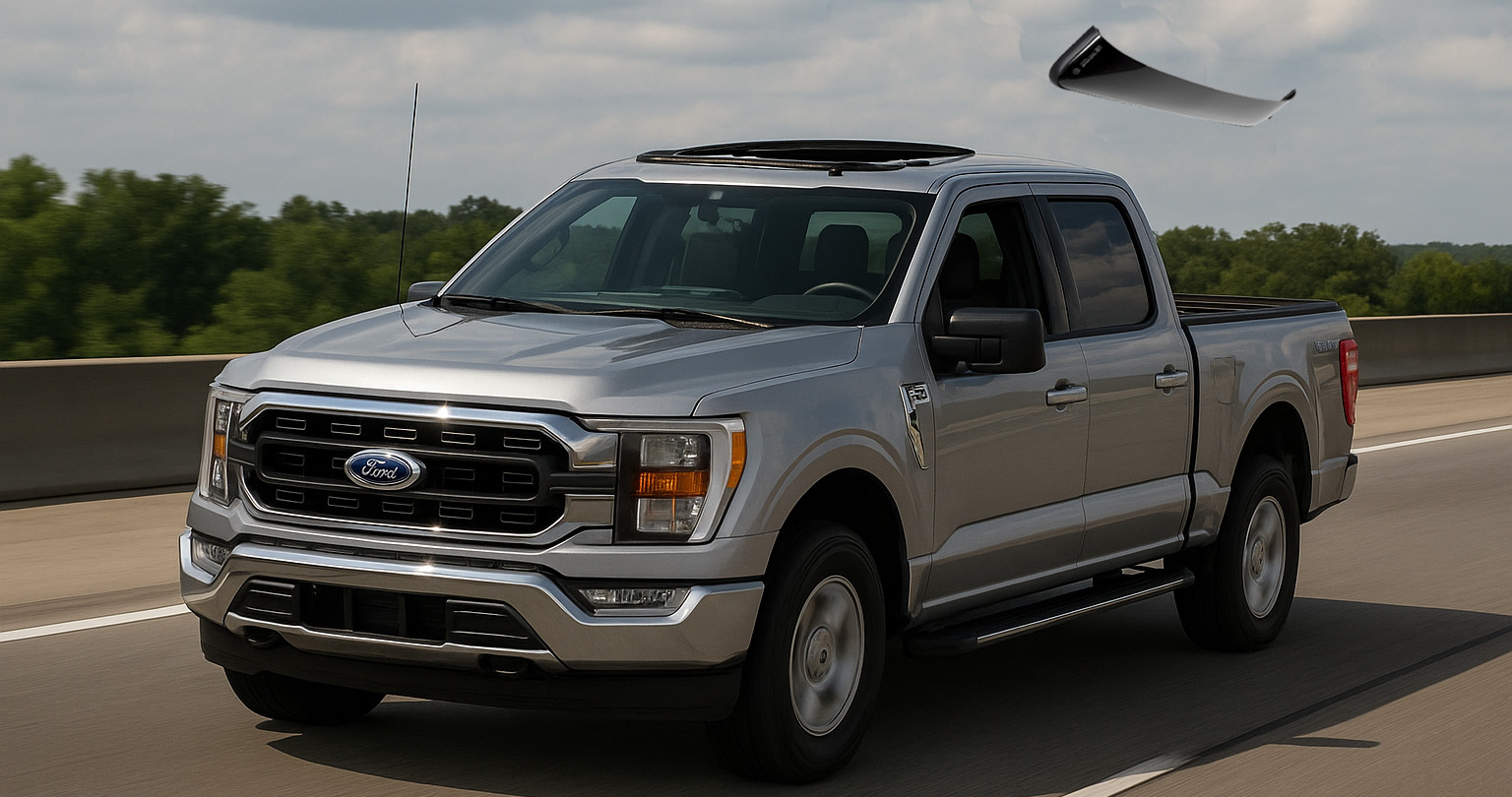F-150, Expedition & Navigator Moonroof Wind Deflector Could Detach

If you own one of the impacted vehicles from Ford Motor Company (Ford) or its luxury brand Lincoln, Ford has discovers a safety defect involving the moonroof wind deflector system. Though the defect may seem minor — clips not secured properly — the wind deflector can detach from your vehicle, become a road hazard, and escalate into a serious safety issue.
This recall affects the following vehicles:
- 2021-2022 Ford Expedition SUVs
- 2021-2022 Lincoln Navigator SUVs
- 2021-2023 Ford F‑150 full-size pickups
- 2022 Ford F‑250 Super Duty, Ford F‑350 Super Duty, & Ford F‑450 Super Duty heavy-duty pickups
Ford’s recall number is 25SB7 and the corresponding National Highway Traffic Safety Administration (NHTSA) campaign number is 25V-290. According to reports, an estimated 174,853 vehicles may be involved in the U.S. alone.
Defect Description
Here’s how Ford describes the defect:
- The moonroof wind deflector (an element that helps redirect airflow when the moonroof is open) is attached by a series of clips to the moonroof frame.
- In the affected vehicles, the clips on the deflector’s fabric lower attachment strip may not have been properly attached to retention tabs.
- Specifically, flash (excess material left from manufacturing) on the wind deflector clips may have prevented them from fully seating during installation.
- As a result, the wind deflector can become loose and potentially detach from the vehicle while driving.
Safety Risk / Consequences
- A detached wind deflector may fly off the vehicle, potentially creating a hazard for other road users. Ford notes that a deflector that fully detaches while driving can create a road hazard … increasing the risk of a crash.
- Owners may notice:
- The wind deflector separating or partially coming away from the vehicle.
- A sudden increase in wind noise or a rattle when the moon roof is open.
- Ford reports two field reports describing separation events in which the deflector hit the driver.
- While Ford states it is not aware of any accidents directly caused by this defect to date, the potential severity is high given the possibility of a part detaching at speed.
Here’s a summary of how Ford’s investigation unfolded:
- Between May and August 2025, Ford’s Field Review Committee approved a separate issue (front door B-pillar trim applique detachment) and then initiated a “read-across” exercise to identify potential similar risks on other Ford and Lincoln lines. During that exercise, a Vehicle Owner Questionnaire (VOQ) flagged a 2023 F-150 wind deflector detachment.
- From September to October 2025, Ford’s Roof Closures engineering team and the Critical Concern Review Group (CCRG) investigated: warranty claim data, NHTSA VOQs, test results (including inducing a wild deflector detachment event), and production/installation process changes spanning 2019-2025.
- As of September 30, 2025, Ford identified 341 warranty reports (May 14, 2021 to May 15, 2025) and two field reports.
- On October 17, 2025, the Field Review Committee approved the field action (recall). Owner letters are expected to be mailed beginning November 3, 2025.
If your vehicle is included in the recall, here is what to expect:
- Dealers will inspect the moon roof wind deflector assembly and, if necessary, repair it free of charge. The inspection involves confirming all 13 wind deflector clips are fully secured to the moon roof frame per the Field Service Action (FSA) technical instructions.
- Owner notification letters will start mailing around November 3, 2025.
- If your vehicle is affected:
- Contact your local Ford or Lincoln dealer and mention Recall 25SB7 / NHTSA 25V-290.
- If you notice increased wind noise, rattling, or visible separation of the wind deflector, contact the dealer immediately.
- Until repaired, minimize driving with the moon roof wide open if you suspect looseness (though Ford has not issued a “do not drive” order, the hazard potential suggests caution).
Lemon-Law / Consumer Protection Implications
- A manufacturer recall indicates the defect is safety-related and affects the vehicle’s use and value. Owners should preserve documentation: notices, communications, service records.
- If the problem recurs after repair (e.g., the wind deflector loosens again), owners may have stronger grounds for a lemon claim depending on state law.
- Even though Ford provides the remedy free of charge, owners should remain vigilant: if the service doesn’t correct the issue and the defect persists.
- Encourage owners to act promptly—use of the moon roof in the meantime could expose them to risk.
Conclusion:
This recall highlights how a seemingly small accessory (the moon roof wind deflector) can carry a real safety risk when improperly installed. If you drive an affected vehicle, watch for signs of the problem. Document everything, because your rights under lemon laws or warranty laws are best protected when you act quickly and thoroughly.